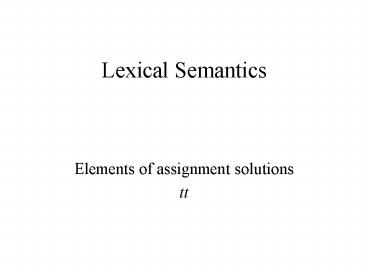Lexical Semantics - PowerPoint PPT Presentation
1 / 19
Title:
Lexical Semantics
Description:
NP Perceiver.Agentive smager p NPAffected. Jeg smagte4 p ... NP Agentive smager NP Patient til. Jeg smagte2 suppen til, men den smager1 stadig ikke af noget ... – PowerPoint PPT presentation
Number of Views:532
Avg rating:3.0/5.0
Title: Lexical Semantics
1
Lexical Semantics
- Elements of assignment solutions
- tt
2
Syntactic contexts for taste
I tasted2 the soup (cold), but it didnt taste1
of anything (to me)
3
Syntactic structures for taste1
Subject
Predicate
Subject
Predicate
Compl
Head
ObjectIndirect
Head
Compl
4
Syntactic structures for taste2
Subject
Predicate
Subject
Predicate
Head
Object
Head
Object
Compl
5
Semantic functions
S
Subject
Predicate
VP
NP
Head
????
NP
V
Det
N
tasted
soup
me
the
This is not ungrammatical but an odd thing to
say (in English!!) - cf. Danish Suppen smagte mig
Verbs not only select syntactic functions
(subject, object, etc.), but also semantic
functions (agent, patient, recipient, etc.)
Semantic functions make up socalled grammatical
frames for verbs
6
Grammatical frames for taste
Taste1
NPPhenomenon tastes
(to me Perceiver.Passive)
Taste2
NPPerceiver tastes NPPhenomenon (AP)
I tasted2 the soup (cold), but it didnt taste1
of anything (to me)
7
Sense perception
Property/attribute
perceive savour
taste1
smack
savour
sample
taste2
distinguish
The metaphorical uses do not concern the senses
of taste, but the nature of NPPhenomenon
8
Smage
Grammatical frames
Den suppe vil (sikkert) smage0 (dig)
Jeg smagte2 suppen (kold), men den smagte1 ikke
af noget
Jeg smagte2 suppen til, men den smager1 stadig
ikke af noget
Jeg smagte4 på suppen, men den smagte1 ikke af
noget
9
Property/attribute
Sense perception
Action
Its easier to translate from English to Danish
than vice versa!
10
Delimiting senses the case of see
21 senses recorded by WordNet
Only those concerned with visual perception are
relevant here
How to identify them by means of WordNet?
- Look up Hypernyms (this is one way to ___)
- Follow the path to its most superordinate term
- Check on them as well
11
Action
(Physical)
(Mental)
(Deliberately)
Perceive
Comprehend
Think
2,4
Move
Watch
Support
Compete
Judge
Confirm
21
14
Meet
Travel
7
1, 3, 6, 18
5, 9, 16, 19
10
13, 20
(By arrangement)
(By chance)
Numbers refer to senses in WordNet
11, 12, 15, 17
8
12
Kinds of situations - according to Alexander
Mourelatos
situations
states
occurrences (actions)
The air smells of jasmine
processes (activities)
events (performances)
Its snowing
developments (accomplishments)
punctual occurrences (achievements)
Examples of physical situations
The sun went down
The cable snapped
13
Kinds of verbal predications - according to
Crofts reading of Zeno Vendler
Aspectual classes
States
Processes
X be happy
Activities (unbounded) (atelic)
Events (bounded) (telic)
X dance
Accomplishments (durative)
Achievements (punctual)
X cross Y
X shatter Y
14
Kinds of situations - according to John Lyons
situation
static dynamic state
agent-control not agent-controlled action
extended punctual extended
punctual activity act
process event
15
Situation types explained
State (of affairs) (tilstand) A (permanent)
condition, with no discernible beginning or end.
A situation which exists. Action (handling) A
situation which happens due to some agent. It
has a beginning, a middle, and an end. Activity
(handlen) An action which happens during an
extend- ed period of time. Emphasis on
middle. Act ( gerning) A sudden action -
resulting in a change of state. Emphasis on
beginning and end. Process (begivenhed) A
situation occurring through time Event
(hændelse) A situation suddenly occurring
16
Simple schematic representation of situations
17
Aktionsart
carries information about types of situations
A part of the lexical meaning of verbs
State verbs
Activity verbs
Act verbs
Process verbs
Event verbs
be
drink
fell
dream
break
have
drive
hit
drown
die
explode
jump
fade
hear
listen
fall
kiss
shake
know
learn
turn
love
fly
feel1
feel2
see
watch
smell1
smell2
taste1
taste2
understand
sleep
18
Aspect ...
carries information about the internal
structure of situations
A part of the grammatical meaning of predications
Beginning
End
Middle
19
Stative verbs used to convey dynamic info-
interaction of aktionsart and aspect
he was living in London ltgt he lived in London he
was being obnoxious ltgt he was obnoxious he was
hearing her ltgt he heard her he was seeing
her ltgt he saw her he was loving her ltgt he loved
her he was having enough ltgt he had enough
Only a very few verbs cannot be so used, eg.
know, own, possess and understand































